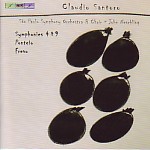Brazilian composer Claudio Santoro (1919-89) ranges all over the place stylistically. His Fourth Symphony sounds recognizably American, with shades of Copland or Carlos Chavez. It ends with a catchy Brazilian folk dance on top of which the chorus sings a rather tacky poem in praise of peace, supposedly reflective of the composer’s communist ideology. Happily, the text never sinks to the depth of the Socialist Realist junk that Shostakovich used in his Second and Third Symphonies; instead, the whole piece has a breezy appeal that’s quite charming. The slow movement is particularly beautiful. So, for that matter, is Ponteio for string orchestra, while Frevo is another splashy and fun essay in folk style.
The Ninth Symphony (1982) is another matter altogether. The level of dissonance is higher, the mood unrelentingly serious, and there are quotations from Beethoven’s Ninth along the way (very well integrated and cleverly used). In short, it’s a tougher nut and it may not appeal to listeners who like the populist Fourth Symphony, but there’s no denying the composer’s high level of craftsmanship, and after listening a couple of times the music springs into focus. Nevertheless, the performances are extremely good, like most of the releases from these forces. The São Paulo Symphony under John Neschling never sounds less than fully committed, and the BIS sonics are terrific. Worth hearing, for sure.
































